Today’s incredibly simple, and simultaneously complex question is: What is time? There are some super deep answers to that simple question, like this one, by Theoretical Physicist Sean Carroll. Carroll discusses what he likes to call an “arrow of time” with the past on one end and the future on the other. Clocks measure this “arrow of time,” but a clock can be anything. Carroll discusses how the Earth and the Sun form a clock, with the Earth rotating around its axis 365 and a quarter times for each revolution around the Sun. For more on Carroll and a video of him see this article as well.
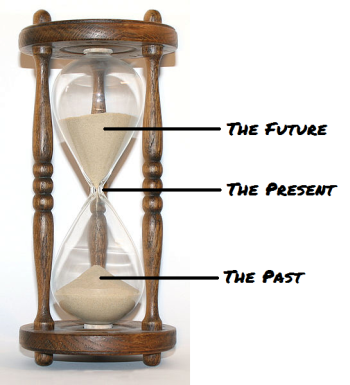
Today we’ll be stepping back from Thermodynamics, entropy, and Time as a dimension type discussions, and instead discuss time as a resource at our disposal. When you think about it our time each day is limited. The very best of us can function on 4-6 hours of sleep, which leaves 18-20 hours a day for everything else. Carve out a commute- a workday, dinner, time with your loved ones, and when it comes down to it there isn’t a whole lot left of that 1/365 revolutions of the earth around the sun.
Time is the Ultimate Non-Renewable Resource
We’ve discussed time here on Milenomics before, asking you to place a value on it, your T-Rate. We’ve also talked a lot about how time can factor into our costs to acquire and manufacture miles and points. The reason I talk so much about time is that it is a limited resource, maybe my most limited. There are only 24 hours in each day. Nothing any of us can do will ever change that (Theory of Relativity aside).
If you’re in a position to spend 8 hours a day researching, driving around, buying, cashing in, and earning miles there is no doubt that will yield amazing results–just as focusing that much time on anything should. If you’re not able to focus that much time on earning miles that’s where Milenomics can help. What good is earning the miles if you then spend them wastefully? We’re focused on both ends of the spectrum–earning our miles as cheaply as possible, and then using them to travel as much as possible for as few miles as possible.
Two miles earned and spent foolishly could be worth less than one earned and spent wisely. And Miles earned and never spent are actually much worse than never earning the miles to begin with. You’ve invested time, and money into those miles, and by not using them you’ve wasted both.
Scarcity Means Giving up Something
If you’re like me, free time is a very scarce resource. I’ve mentioned before, but between sleep, work, time at home with my family, and volunteer commitments I really have about 1 hour a day to spend on miles. This limitation is why I’m so adamant about keeping track of costs–and making sure a MMR to earn miles makes financial sense for me.
All of what I’ve come up with–cost tracking, Demand Schedules, keeping a supply of the miles I need are all because I don’t have time to waste. The Scarcity of Time in your life will dictate what kind of trade-offs you come up with. We all want to fly Business or First everywhere we go–but the scarcity of money (for paid tickets, and to a lesser extent for miles) and time (for earning miles) will dictate how close you get to that goal. This is why on Day 1 of Milenomics I asked you to think of your travel needs not your travel wants.
Miles (Earned) Per Hour
A great part of using Milenomics Cost Tracking is the personal data you collect. After a few months you have a log of all your purchases, the distance driven, and the time it took you to earn those miles. When you need miles for a future trip, say you’re 40,000 miles short, we all know how to calculate the fees we’ll be expected to pay on those 40,000 miles. Divide 40,000 by whatever you’ll earn from each purchase, then Multiply by the fee paid per purchse.
For VR earning at 1x this would look like:
40,000 / 500 = 80 VR x $3.95 = $316
At $.0079 a mile in fixed costs this is not a cost I wouldn’t recommend buying all miles at–but it does make sense 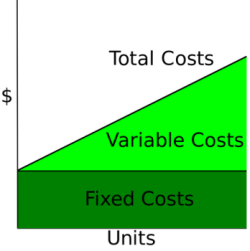 for some types of miles.
for some types of miles.
This is the same no matter if you live in Texas, Florida, Washington, Indiana, so long as you can buy at 1x with a CC this is your fixed cost.
Lets look at how much time it will take you to earn these 40,000 miles. We can do this because of the data we have collected on past purchases. Is this important? Yes, it can be.
A useful tool to use is to calculate your Miles Earned Per Hour. Not to be confused with a measure of speed, this Miles Per Hour is the amount of miles you can earn in 1 hour of “work.” If purchasing 5,000 miles at your local CVS takes 10 minutes the math would be:
(60 minutes / 10 minutes ) * 5000 Miles = 30,000 Miles Per Hour
At 30,000 Miles Per Hour it would take you 1 hour and 20 minutes worth of “work” to earn your 40,000 miles.
The above is an academic example, but how can we know, or at least estimate, the amount of time the purchase of those 40,000 miles will take us?
Pull up your Trusty Cost Tracking Spreadsheet, and run a command which Sums up your time spent, and miles earned, and then Use the above formula =(60/Total Minutes) * Total Miles to get your MPH:
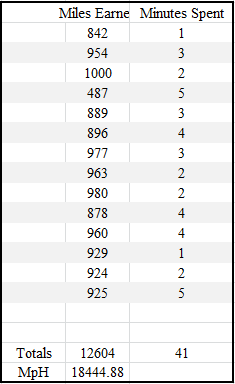
When I have a goal I need I can use this estimate to see if my goal is realistic. If I need to I might even “carve out” the time I will need to earn the miles I need from the rest of my schedule.
Note: You’ll may have noticed in the above I don’t buy 5,000 miles in one shot, as I discussed last year. Sadly one of my best mile earning opportunities died for me late in December, so I may just have to include VR at some point in 2014.
Keeping up with the Joneses
Reading online reviews of trips can make you feel inadequately prepared for your own travel. Threads like this one, which often turn into a “mileage measuring contest” can also push you to keep earning miles you don’t need. You want to have the most, fly the best, and take photos as you do it all. Slow down, and think about what travel is all about: the destination.
I have to commend CanadianKMS writer Jeff on this. In his latest post he echos something I’ve found to be true as well:
“Maybe it’s just me, but I think international first class is just a nice way to travel. In nearly all cases I’ve found the food and sleep which are the one of the primary parts of first class flying to be better on the ground.”
Do what’s best for you–that might mean earning enough miles for coach tickets. Maybe spending less time and money driving to banks, Wal-Mart, Grocery stores, Staples is right for you. You’ll end up with more time to research what to do with an extra day you now have by flying nonstop in coach rather than around the world in 2 days in Business. Or maybe the opposite is true, you love airplanes and want to fly as many as possible. Milenomics is about creating a system, and sticking to that system. No two systems will be alike.
Ultimately your time is just that, yours. Only you decide how much or how little to use/not use on each area of your life. Earning miles and never using them is a great way to waste time and money.
And because I think it is pretty neat, George from www.travelbloggerbuzz.com shared this on Twitter today, a Timeline of the far Future.
Everything below this line is automatically inserted into this post and is not necessarily endorsed by Milenomics:



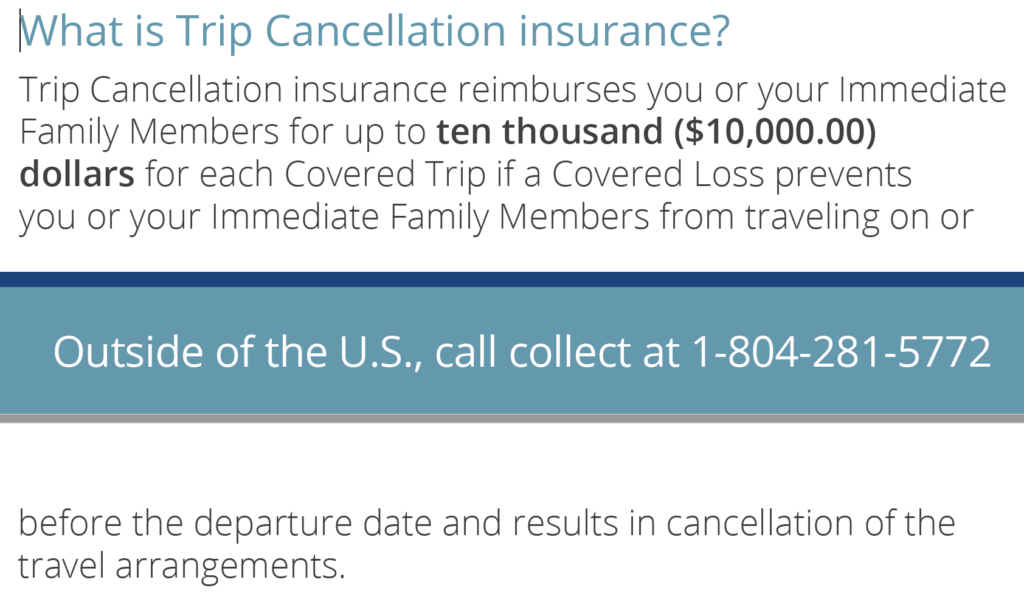

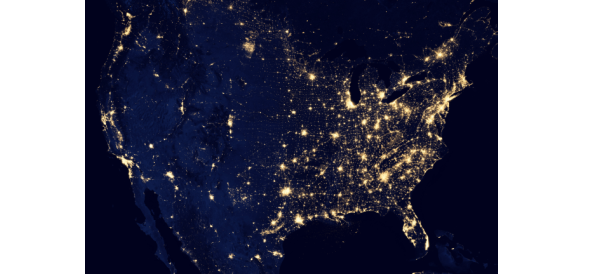
Good post to get people focused on at least considering the time they spend on generating miles for travel.
For me I don’t mind the time as much since travel is a huge part of my life. I travel for work and fun and it is absolutely my number one interest. I research and spend time on travel because I enjoy it. My award booking service exists for those who don’t enjoy it or don’t have the time (or both!).
I am also lucky with my current setup for generating miles. Walmart is half a mile from my house. CVS and my bank are in the same building I work in. My time needed is quite low and gas negligible. I always try to work out Walmart trips when I need to go for something else anyway. I can make CVS and bank runs during my lunch break. It’s also an excuse to get out of the office for a minute.
When I travel for work I also tend to maximize my miles. I try to do all hotel promotions that make sense. I try to choose my flights to literally fly towards my target mileage balance. I add on weekends at some interesting destinations to a work trip. I will make CVS runs and other mileage errands when the company is paying for the rental car and gas. Most importantly I put all company spend on my own credit cards. This is a huge earner for me with all the flights, hotels, car rentals, meals, etc. It all adds up!
I have recently gotten into looking at fixed value and cashback-like credit cards. My plan is to use these currencies for things I cannot use points for: award ticket taxes/fees, incidentals, and other travel expenses I cannot cover with points. It all adds up and if I can offset even some of it then that is more cash for me to retire on or travel more later.
Time is important and like you mentioned you need to be getting a good return on your time investment. You can always get more money, miles, and points. You don’t get any time back.
Robert- I’m sure a lot of people agree–and don’t really “mind” spending the time on buying miles and such–but as you said I want readers to at least focus on the amount of time they spend, and if the return is really worth it. If you enjoy it then by all means continue, and set your T-rate low since you’re getting something from the experneice/hobby.
You’ve got some great tips in your comment–finding the stores that are closest and most convenient to you, and planning your trips to them to coincide with other events that reduce your costs. We should all find our best combination of these, and they might be different for each of us. Cash Back cards are big for me–Discover, Fido, and Amex Blue Cash All the way. No Annual fee too, of course.
And as you said, a professional award booking service can make all the difference in the world. You could spend hours of time and hundreds of dollars earning another 40,000 miles (as in the example from this post). Or, for just the cost of the booking service, you could let a pro book the trip and find out you don’t even need the 40,000 miles.
On an administrative note, I’d be interested in hearing about how you track/pay all the various credit card bills, especially with so much time away from home. Even a few late fees/interest charges (or overdraft fees if it’s all done with autopay) would sharply reduce ROI.
Hi Kate,
Personally I use mint.com which is a free service. It keeps track of my budget as well as all the accounts (us churners have a lot!) over time. When I open new accounts they get automatically added to the list and tracked if it is held under the same username and password. I also add new accounts as needed once and then they get tracked too.
It does a decent job of reminding me if bills due. In addition to that I always set up email alerts for 5-10 days before each credit card bill is due in case I forget to schedule a payment. I also make a habit of sending payments from any reload cards (Vanilla, Visa, Etc) once I load them to bluebird.
Hope this helps!
Kate,
Thanks for the comment. You’re 100% right–one missed payment or overdraft can negate months of hard work, so it is really important to be on top of this.
Bobby’s mint.com recommendation is a great one, and a service I use and recommend as well. The payment reminders are great. It also can help you put together and keep a detailed budget with all your CC purchases automatically entered into the proper categories.
Mint.com doesn’t track everything, so I’ll put a post together a post with more detailed info and get it out there for you and other readers. Especially important is how to track incoming checks, and payments through services like Bluebird.
I never viewed the driving to and from as a factor because I always looked at this as a hobby. So if I golfed or attended sporting events I wouldnt track it either. Maybe I should rethink that
“Maybe it’s just me, but I think international first class is just a nice way to travel. In nearly all cases I’ve found the food and sleep which are the one of the primary parts of first class flying to be better on the ground.”
This is very true. However, you can’t remain on the ground and travel 7,000 miles. My last trip to China left me pretty well shattered for a couple of days after each flight, and that was in Delta economy comfort. After a while, it just hurt too much to sleep. Even an angled business class seat would have made a huge difference for me.
El Ingeniero: How would you approach, for example, JFK-DEN-SEA-NRT in Business vs. JFK-NRT nonstop in coach? One has you wrecked when you arrive, the other has you crisscrossing the country, and possibly taking 8+ hours just to leave the states. I’ve foolishly booked such trips in the past thinking the seat would make up for it. Sure it was much easier to sleep, but I spent an extra 8+ hours doing nothing, and increased the possibility of a mechanical/missconnect. Take those 8 hours and add 4 more hours on a nonstop and I could have slept when I arrived. Further compounding the problem for me is that even in the most comfortable flat seats my wife is unable to sleep on a plane. She’s just too light a sleeper, all the little bumps wake her, so I’ve been conditioned to find us the quickest routes vs. the most luxurious. (See: The boss coefficient).
While I’d certainly recommend using the extra miles if a Business/First seat is open on the ideal route that is not always the case. I’d put more effort into a good route than a good seat.
You’re def. right about the fact that travel cannot be accomplished from home! lol. Jeff’s point, that I was quoting, is that Amazing in the air does not translate into amazing on the ground.
Those of us who don’t live in a hub, flying to a destination that isn’t a hub have to make 2 connections anyway.
Bottom line, I’m going to be making 2 connections at a minimum when we go to visit my in-laws, unless the airlines discover a market for MSP-SHE nonstops. So, may as well get comfy.